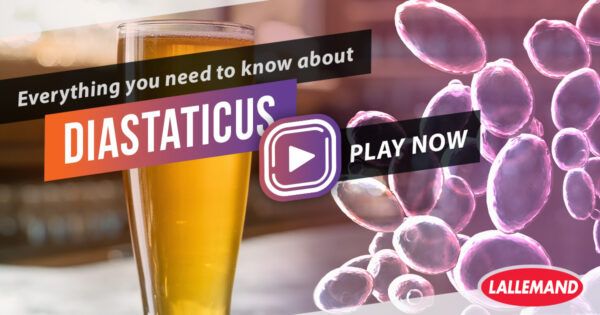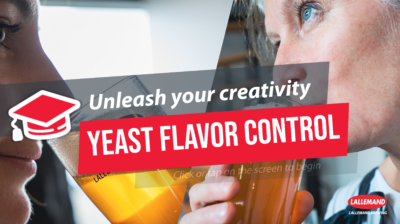Blog | Reading Time 7 minutes
Focusing on the future of the brewing industry with Mark Dredge
Mark Dredge is a beer writer and creator of the BeerDredge beer flavour wheels. He answered a few questions for us about his vision of where the industry is headed.
As a well-known beer writer with knowledge from history to sensory, what is your vision of the future of the industry?
I’m terrible at predicting the future of beer. I thought Hazy IPAs were a fad that’d last a few months and then disappear! How wrong was I ?! There’s definitely a few things that I think will be important in the coming years.
I think, and I hope, we see more great alcohol-free beer, especially in modern styles that we love (like the Hazy IPA!), and that we see them on draft more often. I already drink a lot of alcohol-free beer, and it’s become something that I look for when I visit breweries and taprooms.
Speaking of taprooms, I think these are increasingly important as they can become a place that’s more than just somewhere to get beer. They can become important social centres and develop a sense of community, where they bring people together. Around this, brewery centred activities, like run clubs, yoga, craft classes, and so on, will be nice ways of bringing more people into breweries, and having them use the spaces in ways beyond just the beer.
What do you think will be the biggest beer style trends for 2023 and beyond?
I think the Hazy IPA revolution will continue, but we’ll see more brewers experimenting with yeasts, hop varieties and brewing processes to give us different expressions of hops and fermentation. Alongside that, we’ll see West Coast IPAs more prominently, both as an alternative to the hazy beers and also as a throwback to the beers of a decade ago. We might even see a nostalgic interest in classic IPAs, which sees a renewal in those older brands.
More great lager is a trend I always seem to repeat, and it’s clear that more brewers are focusing on great lagers today, and not just as a simple, refreshing beer to have in their taproom. Lager brewing has got serious. I like how there’s interest in authentically recreating classic European styles, and serving properly in the correct glasses with lots of foam. But I also like how breweries are making their own versions of crisp light American lagers as well as IPLs, cold IPA and dry-hopped pilsners.
Beyond styles, I think we’re seeing more interest in the service of beer. It’s a challenging global economy right now, which might see more people drinking at home, so when we do go out to bars we’ll go to places where they do a great job of the service, whether that’s nice glassware, great staff knowledge, or by utilising special ways of serving beer: casks of ale that have been properly conditioned; side-pour faucets for lagers; and having smaller glasses for styles like Kölsch and Altbier. It’s adding value and quality to the drinking experience.
Big industrial players have always led the market, but we see craft beer brewers more interested in producing lagers these days, what is your opinion on this?
This is one of the most exciting things to me in craft beer. I love great lager, and the great varieties of lagers that are made around the world. It’s amazing to see brewers making their own versions of classic styles (especially if the brewers have spent time travelling to really learn about those styles and drink them locally in Europe), and also innovating by creating contemporary lagers.
It’s also exciting to see brewers making use of classic brewing techniques like decoction mashes, and also installing taps to specifically serve these beers in the best way. No matter how well the beer is brewed, the service of it in bars will determine how well a drinker enjoys it.
Your recent book “Beer: A Tasting Course” is a wonderful example of a global movement of brewers and consumers wishing to educate themselves. What impact do you see this having on the beer industry as a whole?
Education is something I’m really passionate about in beer, and it’s important across the beer industry, and not just for new drinkers. Even the most experienced drinkers and brewers should be looking at beer education and trying to learn how to speak with the people who might want to buy their beer.
For me, the simplest way to judge success in beer education is about whether someone gets the beer they are most likely to enjoy in that moment. If the consumer is able to describe that beer, and the person serving or selling the beer is able to understand that and make the right suggestions, then everyone is going to be happy.
I think all beer education should begin with a broad knowledge of classic styles. The beer tasting book is about understanding where f lavour comes from, from each of the main ingredients and through brewing processes, and then describing how classic beer styles taste.
I also developed a series of Beer Flavour Wheels to capture the lexicon of beer. I created wheels for hops, grain and fermentation to put all the words in one place to help build that general vocabulary and help people to speak the same beer language. That’s another really important aspect of education and communication.
What do you see as the greatest step forward of the beer industry in the past 5 years, and what do you feel is needed for the future growth of the industry to continue moving forward?
The general accessibility of great beer is certainly important, and means that people can find it wherever they are. That might be beer from larger craft breweries, or beers bought in the supermarket instead of the craft beer store, but it’s a first step towards getting better beer in the hands of more drinkers. By getting more people to start exploring other beers, and to be curious about different styles, the hope is that they start visiting specialist beer venues and breweries. The industry only grows if we have more drinkers coming in.
Future growth is dependent on having spaces that more people feel comfortable in. Craft beer can be confusing, alienating, even challenging, and we need to be better as an industry and making everyone feel welcome and feel like craft beer is something that they can enjoy.
Just for fun, what has been your best beer experience to date?
This is a hard question to answer––and I wrote a book called The Beer Bucket List to search for these experiences!––and there are a few which are always high on the list, like drinking in the Pilsner Urquell cellars. But there’s something really special about going to a town called Forchheim in Franconia, where they have the ‘Kellerwald’ or a forest of old lagering cellars, and above those cellars are beer gardens. The best time to go is for their annual Annafest celebration where over 20 cellars serve local beer. It’s an incredible thing to experience!
Learn more about Mark Dredge, his books or the Beer Flavours Wheels, here.
Published Jan 25, 2023 | Updated Jan 31, 2024
Related articles
Need specific information?
Talk to an expert


